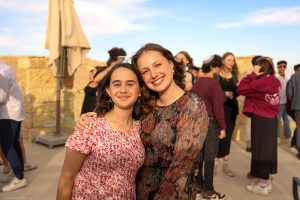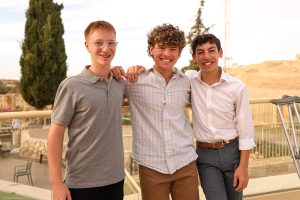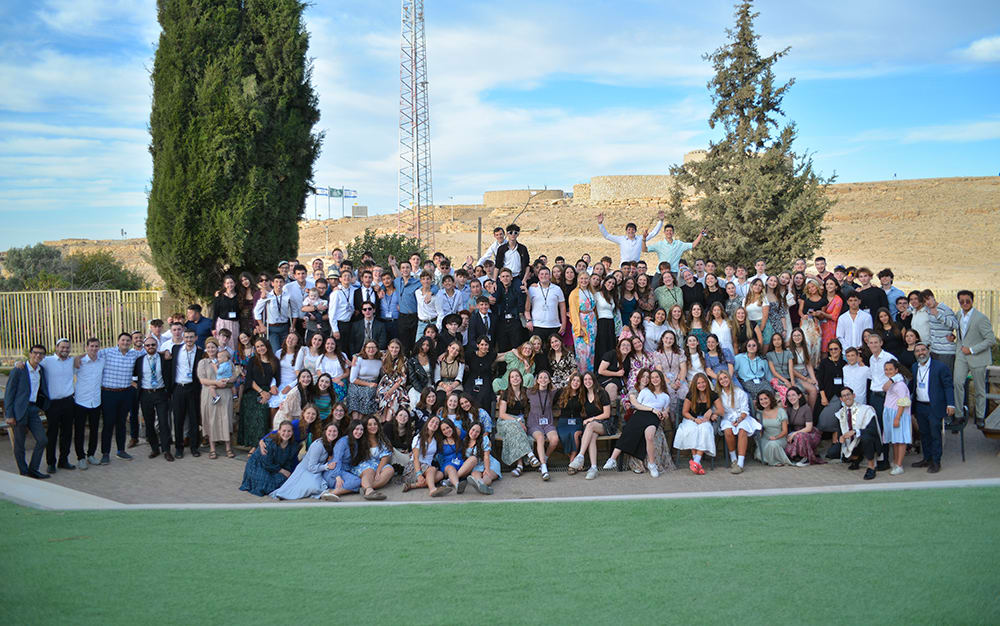Since 2015, NCSY Israel has served as a home away from home for English-speaking teen olim across the country with five chapters in Yerushalayim, Bet Shemesh, Modin, Gush Ezion and Ra’anana. This past year, about 500 adolescents participated in NCSY Israel’s cultural, social and educational programs and attended three regional annual shabbatons.
Ahead of Shavuot, over 100 teens are expected to participate in “YAIR: Expressing Our Soul,” NCSY Israel’s Yom Iyun that will include shiurim on The Balance Between Body and Soul, Infinite Redemption, Beyond Sight: Looking Through the Lens of the Soul, and workshops entitled Visualizing Your Future, Laugh All the Way Up to Your Soul, and Music, Poetry and Photography as Avodat Hashem. The day will conclude with a delicious hot dog dinner and concert featuring the Solomon Brothers — including Yehuda Solomon of the Moshav Band — and a special address from OU-NCSY Mashpiah Rabbi Judah Mischel, executive director of Camp HASC (Hebrew Academy for Special Children). Minister of Aliyah and Integration Ofir Sofer, a former IDF major and a disabled veteran, will be among the day’s distinguished presenters.
We chatted with NCSY Israel’s cofounders, Executive Director Rabbi Michael Kahn and Regional Director Rabbi Yosef Ginsberg, about the Yom Iyun’s connection to Shavuot and the mood in Israel ahead of the holiday in the shadow of the war. Having recently been discharged from reserve duty, or miluim, Rabbis Kahn and Ginsberg also discussed their second jobs: protecting the land and citizens of Eretz Yisrael. The conversation has been edited for brevity.
How is NCSY in Israel different from NCSY in the U.S., where its focus is largely on kiruv?
Rabbi Kahn: In Israel, high school students serve as madrichim (counselors) for younger grades; there is no framework for teens to be chanichim (campers), except at NCSY Israel.
NCSY Israel is the central address for all English-speaking teen olim. It serves as a soft landing place where they can relate to advisors who understand where they’re coming from, can guide them around Israel’s culture, and provide mentorship and inspiration for personal and religious growth. For a teen, who’s handling everything that comes with adolescence along with being a new immigrant, to have an environment that feels like home is priceless. NCSY Israel is not just a general youth group. It’s a place where Anglo teens can thrive in a new environment and culture.

How does the Yom Iyun’s theme,“Yair: Expressing Our Soul”, relate to Shavuot?
Rabbi Ginsberg: The theme of expressing our soul connects to the bittersweet year we’ve been experiencing since October 7. On one hand, we went through one of the biggest tragedies since the Holocaust. On the other, since Simchat Torah, we’ve never felt more connected as a people, K’Ish Echad B’Lev Echad. Now that we are about to receive the Torah on Shavuot, and feel this tremendous sense of achdut, how do we express ourselves? What do we do with these feelings, with our rollercoaster of emotions? At the Yom Iyun, teens will learn to express those conflicting emotions via various outlets, including shiurim, workshops, and writing.
Could you elaborate on your presenter lineup?
Rabbi Ginsberg: Our presenters serve in a variety of unique and inspiring positions:
Meryl Lee Avraham is the assistant director and menahelet of Midreshet Machon Maayan.
Rabbi Moshe Benovitz is the managing director of NCSY and director of NCSY Kollel.
Shoshana Judelman teaches shiurim online and in Efrat, works as a guide at Yad Vashem, and co-leads inspirational trips for women to Ukraine.
Marc Fein is a leadership coach, educational consultant, mental health advocate, and a former NCSY regional director.
Debbie Hirsch is the founder and director of Laughter Games Workshops and has performed on stage worldwide.
Rabbi Dovid’l Weinberg is a senior rebbe at Yeshivat Orayta, the Rosh Kollel of Camp HASC’s Kollel Toras Chesed, a musician and author.
Switching gears, you were both recently released from miluim, after serving for the majority of the war. What are your roles in Tzahal, and where were you stationed?
Rabbi Kahn: I’m an officer in the Hagmar (Haganah Merchavit, Homefront Defense) unit, which is in charge of security for different yishuvim in Yehuda and Shomron. Every yishuv always has a kitat konenut, a first response unit, which usually comprises between 12 to 15 men. During times of war, additional groups of about 40 chayalim are stationed in these areas to add an extra level of security. In addition to overseeing shmirot (guard watches) and other responsibilities, I was also in charge of the unit’s logistics and operations, including fundraising, our unit’s equipment needs, and other daily functions to ensure that every chayal has everything he needs in order to perform at his best. I live in Yishuv Neriyah, and was stationed in Nachliel, a neighboring yishuv.
Rabbi Ginsberg: I belong to an attachment unit within the Nachshon battalion of the Kfir Brigade. It’s not a regular miluim unit; I work in casualty evacuation alongside eight to 10 combat soldiers who are performing their regular service. We’re called specifically during intense fighting and border escalations. For three months I served up north near the Lebanese border, in the Kiryat Shmonah region..
How is Shavuot observed in Tzahal — is there time to learn, for example?
Rabbi Ginsberg: How is anything observed in Tzahal?! When you serve in the army, your job comes first. It definitely feels very funny in the beginning to be doing things that are forbidden on Shabbat —like using your phone, driving around in a Jeep or clearing your rifle; A person works so hard to be an observant Jew. But in Tzahal, it’s actually a mitzvah to do those activities, for the sake of saving lives. Being on duty leaves very little time for personal pursuits, like learning Torah, but the Torah that you learn in the army gets absorbed one hundred percent. It’s a lot more about quality than quantity.
How are you preparing emotionally in the event that you will be called up on the chag?
Rabbi Kahn: In terms of being emotionally prepared, I think everyone is ready to jump in at any moment. I’m ready to drop everything at any second if I am called. Right now I’m more focused on my family and trying to return to work at full capacity, but I’m always ready for anything. Before October 7, I didn’t have that same perspective.

As Shavuot approaches, could you describe the general mood in Israel in the shadow of the war, when our hostages are still not home and our chayalim are still on the battlefields?
Rabbi Kahn: I think the general emotions are mixed. The media’s overwhelming portrayal of a divided nation is inaccurate. Since October 7, our achdut has been very strong. At the same time, as different footage is posted, it’s always hard to simply proceed with normal day-to-day life. As much as we try to continue to move on and to work, our heads are always there. It’s a very complex existence when you’re aware of everything going on in Gaza and you hear the stories, and you don’t know which hostages are even alive, and what conditions they are in. Trying to move forward and be in a state of simcha around Yom Tov while we’re in a constant state of pain is so challenging.
While I don’t believe anyone has accepted the reality in Israel, I still think there’s a tremendous avira of ratzon — of wanting and yearning — for a complete victory, and for Moshiach. We’re evolving as a people, and I think as a nation, we’re changing in the right direction.
The words of this author reflect his/her own opinions and do not necessarily represent the official position of the Orthodox Union.

